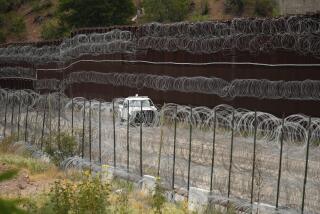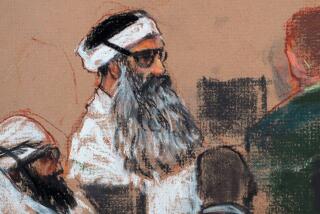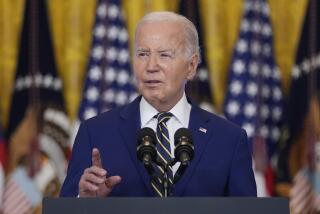They are ‘enemy combatants’ no more
- Share via
WASHINGTON — There will no longer will be “enemy combatants” at Guantanamo Bay, Cuba, the Obama administration said Friday. Moreover, the new president no longer claims that his title as commander in chief allows him to order people deemed to be dangerous captured and held without trial.
Having abandoned a favored Bush administration term in the war on terrorism, however, the new administration has claimed roughly the same power to hold Guantanamo’s detainees indefinitely -- even those who never held a gun or went near a battlefield.
The Justice Department emphasized the terminology change in a news release.
But lawyers who have been fighting the government’s detention policies countered that nothing had changed. The Center for Constitutional Rights said the new administration “offers essentially the same definition of ‘enemy combatant’ without using the term.”
Friday’s announcement arose as a result of last year’s Supreme Court ruling that said Guantanamo prisoners could challenge their detention before a federal judge. Lawyers filed hundreds of petitions on their behalf.
Several federal judges were forced to decide what the Supreme Court had left undecided: Who exactly can be held indefinitely as a prisoner in the war on terrorism? Is the definition limited to those believed to be terrorists and fighters who carried guns, or does it extend to civilians who were arrested in Bosnia-Herzegovina or Pakistan and were suspected of conspiring with Al Qaeda?
In the 12-page legal memo sent to a judge Friday, the administration said it had tweaked the government’s definition of who can be held without charges. The new definition says those who “substantially supported” Al Qaeda or the Taliban can be held, regardless of where they were captured. The prior definition referred to those who gave “support” to Al Qaeda or the Taliban.
President Obama’s lawyers said Congress gave him the authority he needed when it authorized the use of military force one week after the Sept. 11 attacks. It said the president can use the military against “nations, organizations or persons” who planned or aided the terrorist attacks.
President George W. Bush cited the same authority when he created the prison at the U.S. naval base at Guantanamo Bay, but he also said he could act on his own as commander in chief.
Friday’s announcement applies only to the Guantanamo prisoners, the government said. It does not cover future captures.
Reactions to the announcement differed sharply. Military Families United saw the change as a “drastic dismantling of the war on terror.” The American Civil Liberties Union called it “deeply troubling” because it retained an “overly broad interpretation” of who can be held as a war prisoner.
Boston lawyer Stephen Oleskey said the court process has proved frustrating. He represented six Algerian-born men who were arrested in Bosnia, taken by the U.S. military to Guantanamo in 2002 and held for six years. One of them, Lakhdar Boumediene, was the lead plaintiff in the winning case before the Supreme Court last year. In November, a federal judge ruled that the government could not justify holding Boumediene and four of the other Algerians and ordered their release.
Nonetheless, Boumediene and another Algerian ordered freed remain prisoners at Guantanamo, because the Bosnian government has refused to take them back. “Our judicial system has given them their freedom, but they are not free,” Oleskey said. “It’s very hard to explain that to them.”
--
More to Read
Sign up for Essential California
The most important California stories and recommendations in your inbox every morning.
You may occasionally receive promotional content from the Los Angeles Times.











